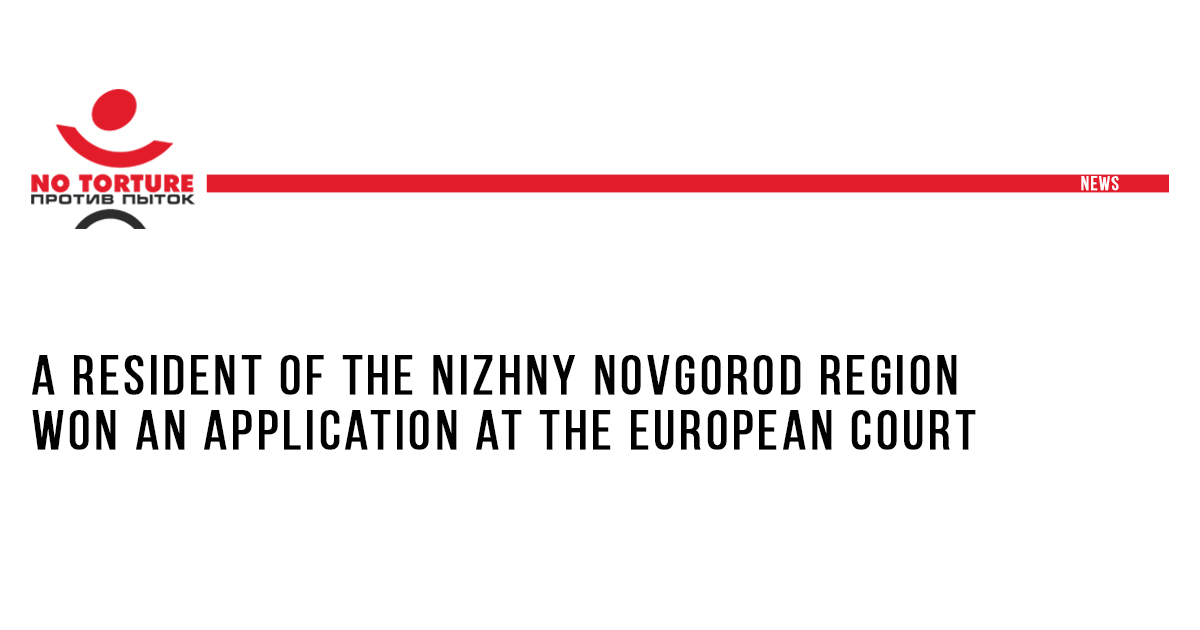Today, on 15 June 2021, the European Court of Human Rights passed a ruling with regard to the application of Aleksandr Milovanov from the Nizhny Novgorod region on his battery by drug enforcement officers in 2008. The court established that Aleksandr was subjected to illegal physical violence and that no effective investigation was conducted with regard to his application. The Strasbourg judges also established that in the criminal case against Milovanov some evidence was used which was obtained as a result of brutal treatment. Aleksandr was awarded a compensation of moral damage in the amount of twenty-six thousand euro, and now he may count of review of his criminal case at the national level.
As we have previously reported, on 18 June 2008, Aleksandr Milovanov from Sarov town of the Nizhny Novgorod region was apprehended by local drug enforcement officers. According to him, they attempted to find narcotic substances on him, but did not, and then one of the drug enforcement officers led him behind the car and started to stuff his pockets some sachets. Aleksandr started to resist that, after which he received a blow in the chest and in the groin by the officer. After he was taken to the Sarov Drug Enforcement Department, these sachets were officially “revealed” in Aleksandr’s pockets, and some narcotic substance turned out to be inside them.
According to Milovanov, he was asked to sign some papers, but he refused, after that one of the officers handcuffed his hands behind his back, brought him down on the floor and started to beat him and kick him.
As Aleksandr recalls, the police officer took out an electric shocker and started to apply it to various body parts. Having failed to achieve the expected result, the officer continued the battery with a wide belt, as well as beating the heals with a baseball bat.
“The one who was beating me up, took an electric drill with a drill bit, plugged it in and said that if I did not sign the documents he would drill my brains out. His eyes were crazy, wide and rolling,” – Aleksandr recalls. As a result, he signed all the papers which the drug enforcement officers were giving him.
On 20 June 2008, during admittance to the Temporary Confinement Cell, Mr Milovanov was examined by the doctor who registered numerous bodily injuries on him, namely: “A bruise in the chest area and six hematomas, one on the right and five along the back surface of the thighs”.
Subsequently, Aleksandr was convicted for crimes related to illegal drugs trafficking and was sentenced to twelve years’ prison term.
Aleksandr reported tortures to law-enforcement authorities. The investigators nine times dismissed the claims to open a criminal case based on his application. The materials of the check were repeatedly transferred from one department to another: from the Investigative Department for the Closed Administrative-Territorial Unit of the town of Sarov – to the Military Investigative Directorate under the Prosecutor’s Office for the Nizhny Novgorod garrison, and back. During the check, one of the drug enforcement officers acknowledged the fact of applying tortures to Milovanov, but the investigator on his own decided this confession to be factitious and never opened a case.
In August 2010, lawyers with the Committee Against Torture applied to the European Court of Human Rights on behalf of Aleksandr. The court communicated the complaint in 2011 and today, passed the ruling thereof.
The court acknowledged that Aleksandr Milovanov, in violation of Article 3 of the Convention, was subjected to brutal treatment and that no effective investigation was carried out with this regard. Due to this, the applicant was awarded a compensation for moral damage in the amount of twenty six thousand euro.
“In addition, in today’s ruling, the European Court of Human Rights established that the proceedings in the criminal case against Milovanov was unfair since the judgement was based on the evidence extracted as a result of brutal treatment. Such a conclusion of the ECHR means that the verdict on this criminal case may be reviewed after many years”, – lawyer on international legislation with the Committee Against Torture Mariya Zadorozhnaya comments.
